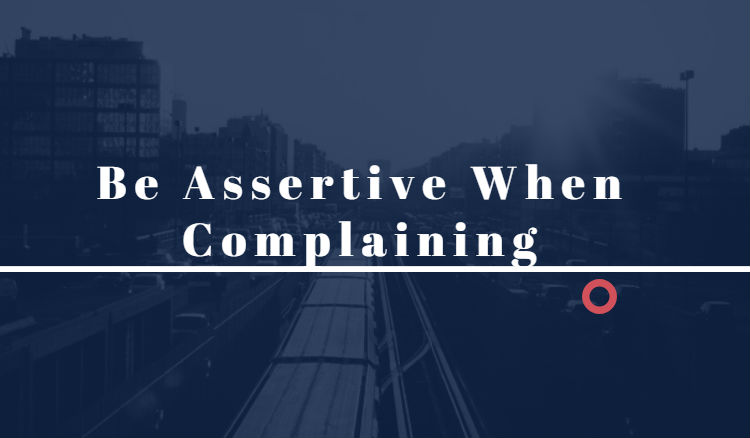Be Assertive When Complaining
What is “Being Assertive?”
It is interesting that different sources describe assertion in different ways:
A confident and forceful statement of fact or belief.
A positive statement or declaration, often without support or reason.
When knowledge and persuasion are linked.
Behaviour which enables a person to act in his/her own best interests.
To stand up for oneself without undue anxiety.
To express one’s honest feeling comfortably.
To exercise one’s own rights without denying the rights of others.
Although I do not completely agree with all these definitions, they do give a flavour of what assertion really is about.
In example 1, the word “forceful” seems to be a misunderstanding of assertion since it should not be necessary to be forceful to state your point of view in a statement. Quite the opposite is true; an assertive statement does not need force. It simply needs to be a true statement of your view, position or perception.
7 would seem to be much more applicable because an assertive statement is about you and not about “forcing” other people to accept or believe.
Often the way a statement is made can make a difference. A voice heavily laden with emotion does not work as well as a calm simple statement of fact. Your tone of voice is important.
Complaining or Cancelling Contracts
This is often an emotional time since organisations make it difficult for us to get through the process of cancelling or changing contracts. Complaints often mean we are upset, angry or disappointed. Emotions are involved and we cannot deny it.
To see a process to help you complain or cancel contracts. See this link:
LINK TO “HOW CAN I CANCELL MY CONTRACT”
To be assertive in cancelling or amending contracts, it means getting down your intentions in black and white, either in a text document or handwritten the old-fashioned way. It will help you to see what you want written down. E.g. “I want this contract to be cancelled.”
Express what you want in positive terms. E.g.” I want you to cancel my contract from this date.”
Tell them exactly what you want them to do. Avoid negative sentences like: “I do not want this contract anymore.”
If you need something cancelled before the contract time’s is up then have a reason written out on your crib sheet.
Avoid becoming emotional, but if you are feeling unhappy about what is happening, say that in a calm way. E.g. I am very unhappy with this product/ service/contract and the difficulties in getting it resolved are causing me anxieties.
If the person you are talking to says they cannot solve your problem / change the contract, ask for someone who can do it. This will usually mean you speak to someone senior who has more authority.
Your crib-sheet with your statements and reasons is very important. Keep looking at it to remind yourself of what you want.
Being assertive does not mean forcing others to do what you want. In a complaint situation, you are the one paying the money and you have a right to get what you are paying for and stop paying when you no longer want the service.
It is not necessary to explain why you want something but have a reason lined up, ready to give.
Use the magic word “Because.”
Do not say: ”Please.” You are not asking them to do something, you are telling them what you want.
Persuasion
2 rules of persuasion are
- Use “because.”
- Repeat your request.
Think About How Children Get Their Own Way. It Goes Like This:
- Child asks “Can I have an ice cream?”
- Parent: “No.”
- “I want an ice cream.”
- “No.”
- “Please may I have an ice cream?”
- “No.”
- “I really need an ice cream, please, please, please.”
- “Why do you want an ice cream?”
- “Because I want one now, please, please, please. I will be really good if I can have an ice cream. Can I have one, please? Please?”
- “Oh for goodness sake, stop going on. Here, go and get an ice cream and shut up.”
Look at the persuasion: Repeat the request / use “because.” The reason given does not have to make sense at all.
How Many Times Have You Heard Arguments Like This?
Children Can be Wonderful Teachers
Imagine This Conversation:
- “I want to cancel this contract.”
- “What is your reason?”
- ”Because I do not need it any more.”
- “Can you explain a bit more? Is it because…”
- “I want to cancel this contract”
- “We just need to put a reason down here to complete our statistics.”
- “Because I do not need it anymore. I want to cancel the contract.”
- “OK.OK. you do realise you will…….. if you cancel now?”
- “I want to cancel the contract.”
- “When would you like the cancellation from?”
- “Now.”
- “Can we interest you in a rebate / discount for a year? I can organise that now. A lot of our customers like this option.”
- “I want to cancel the contract.”
- “May we call you back in a few months to offer you a really good new offer we have in the pipeline?”
- “No. I want to cancel the contract.”
- “I have organised that for you and we have emailed a confirmation to you. Thank you for calling.”
Read More : How Can I Cancel My Contract?




